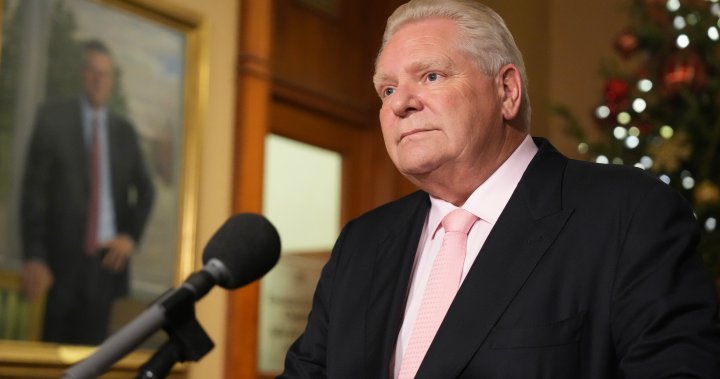The escalating trade tensions between Canada and the United States have ignited a war of words, with Ontario Premier Doug Ford threatening to retaliate against President-elect Donald Trump’s proposed tariffs by halting energy exports to the US. This bold move raises questions about the potential consequences of such an action and the broader implications for Canada-US trade relations. While Ford’s threat is intended to demonstrate resolve in protecting Canadian interests, experts caution against engaging in a trade war with a significantly larger economic power like the United States.
Ford’s threat came in response to Trump’s campaign promise to impose a 25% tariff on all Canadian imports upon taking office in 2025. This has sparked concern among Canadian premiers, who met with Prime Minister Justin Trudeau to discuss potential countermeasures. Ford’s proposal to “cut off” energy exports to bordering US states, potentially affecting millions of American residents, reflects a desire to inflict reciprocal economic pain. However, the feasibility and effectiveness of such a strategy remain uncertain.
Experts warn that Canada’s economy, particularly its energy sector, is more vulnerable to disruptions than that of the United States. Engaging in a tit-for-tat trade war could jeopardize Canadian jobs and economic growth, especially in the energy sector, which provides high-paying jobs. While Ontario exports a significant amount of energy to US states like Michigan and New York, these exports represent a small fraction of those states’ total energy consumption. Conversely, Canada’s reliance on the US market for its energy exports is much greater, making it more susceptible to economic fallout.
Furthermore, a trade war could extend beyond the energy sector, potentially impacting other key industries such as automotive manufacturing, a significant contributor to Ontario’s economy. Ontario, being the highest-value exporting province to the US, relies heavily on its southern neighbour for trade. Its top exports, including motor vehicles and gold, generate billions of dollars annually. Retaliatory measures by the US against these industries could severely impact Ontario’s economy.
Alberta Premier Danielle Smith has voiced her opposition to cutting off energy exports, highlighting the devastating economic consequences such a move would have for her province. Alberta is the largest exporter of crude oil to the US, with the majority of Canada’s oil exports originating there. Disrupting this trade flow would inflict significant damage on Alberta’s economy, a risk Smith is unwilling to take. This divergence in opinion underscores the complex interplay of provincial and national interests in navigating trade disputes.
Amidst global geopolitical instability, including conflicts in the Middle East and Eastern Europe, some argue that Canada should position itself as a reliable energy partner for the US. Rather than restricting trade, proponents of this view advocate for increased energy collaboration between the two nations. However, the escalating trade rhetoric and the threat of retaliatory actions create uncertainty about the future of Canada-US energy cooperation. The significant economic disparity between the two countries underscores the potential for greater economic harm to Canada in a prolonged trade war, making a strategic and measured approach crucial for protecting Canadian interests.










